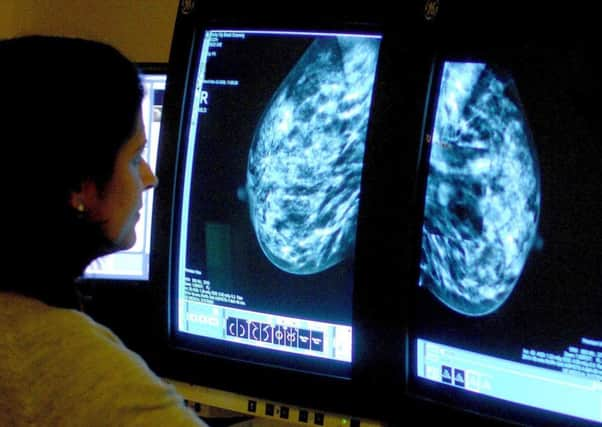Breast cancer patients risk of ‘severe’ surgery


The UK-wide audit of patients with ductal carcinoma in situ (DCIS) – where cells in the milk ducts in the breast start to turn into cancer – found most women were receivingthe correct surgery.
But the researchers from the Western General Hospital in Edinburgh found that others were having to have mastectomies as a result of either failed surgery to conserve the breast or for tumours so small they would normally be removed in isolation.
Advertisement
Hide AdAdvertisement
Hide AdSpeaking at the European Breast Cancer Conference in Glasgow yesterday, Dr Jeremy Thomas said they also found large variations between hospitals in the likelihood of women having more radical treatment after being diagnosed with DCIS.
More than 4,600 women a year in the UK are diagnosed with DCIS. In these patients, cancerous cells are contained within the ducts and have not started to spread to the surrounding tissue.
But it can be difficult to identify the extent of the disease correctly due to the way cells show up on mammogram screenings and in tissue tests. Decisions on the best treatment involve discussions with radiologists, pathologists, surgeons, oncologists and nurses.
Dr Thomas and colleagues collected data from 8,313 patients with DCIS detected during screening from 2003 to 2012.
Of the 6,633 women who had breast conservation surgery – a lumpectomy to remove the cancerous cells but leave the rest of the breast intact – 799 (12 per cent) ended up needing a mastectomy.
There were 2,479 women in the study who had a mastectomy either as their first course of treatment or as a result of failed conservation surgery.
Of these, 510 (21 per cent) had mastectomies for tumours smaller than 20mm. These would normally be treated with a lumpectomy.
Dr Thomas estimated that the results meant that around 100 women a year may be having unnecessary mastectomies in the UK due to tumours being so small, though it is possible that some of these women may have opted for a mastectomy anyway.
Advertisement
Hide AdAdvertisement
Hide AdBut researchers also found wide variations in the percentages of patients undergoing different types of surgery.
Of 57 hospitals with the highest number of patients, the proportion of failed breast conservation surgery ranged from 3 to 32 per cent, while those for mastectomies for small tumours ranged from 0 to 60 per cent.
Dr Thomas said: “It would appear that, in some hospitals, the discussions in the multi-disciplinary teams are not looking in enough detail at the results from the mammograms and pathology in order to make the right decision about the best surgical treatment for these women.
“DCIS accounts for about 20 per cent of the cancers detected and managed by the NHS breast screening programme and, overall, our data show that it is working very well.”